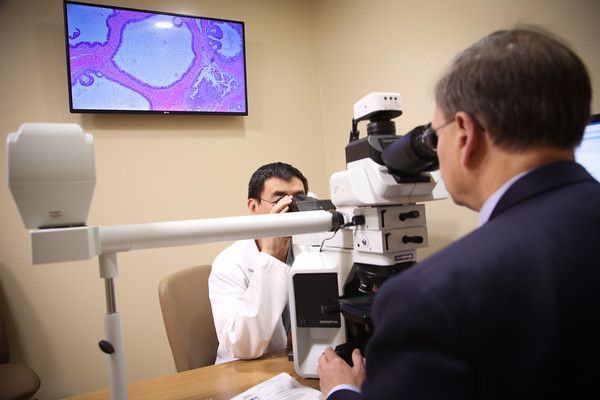Pathologists are key partners of the medical team whose investigations and findings are essential to successful surgical and treatment plans for cancer patients.
“Pathologists are doctors who work in the laboratory, analyzing data that provides test results which ultimately provide the bases for your doctor's treatment decisions,” explains Dr. Charles LeVea, MD, PhD, Chair of the Department of Pathology and Laboratory Medicine.
“Pathology reports give us the scientific data about each individual patient that accounts for the majority of the information we need – about 60 percent – before making any critical decisions. The doctors who review the pathology reports that involve pancreatic cancer are subspecialized GI (gastroenterologist) surgical pathologists, whose specialty is in this area for specific diagnosis of pancreatic cancer.”
Pancreatic cancer accounts for about three percent of all cancers in the United States. The American Cancer Society estimates that about 27,970 men and 25,700 women in the United States will be diagnosed with pancreatic cancer in 2017.
Diagnosis of pancreatic cancer typically starts with signs and symptoms that include the whites of a person’s eyes yellowing, as well as their skin taking on a yellow hue. Other symptoms may include pain experienced just below the ribs that radiates towards the back. These symptoms are often accompanied by unintended weight loss.
“When a patient comes to us with these symptoms, medical oncologists or surgeons typically request a CT scan (computed tomography) of the abdomen to check for a mass or a cystic mass within the pancreas. A gastroenterologist will perform an endoscopic biopsy and/or a fine needle aspiration of the mass to obtain some tissue and/or cells for diagnosis by a pathologist. The pathologist will then determine the type of pancreatic cancer from the sample,” explains Dr. LeVea.
Typical procedures include an endoscopic biopsy, where a thin flexible tube (endoscope) is inserted into the abdomen to remove a small amount of tissue and fluid from the pancreas. This tissue is sent to pathology where the process includes fixing and embedding the sample into paraffin wax, so it can be cut into extremely thin slices, which when placed on glass slides and stained can be viewed clearly under a microscope. The pathologist will view the biopsy to determine if tumor cells are present and, if they are, determine the type of tumor.
What to Expect from a Pathology Report
Biopsy pathology reports will diagnose pancreatic cancer, including its subtype and any relevant tumor characteristics needed to treat it. After surgery to remove the pancreatic cancer, an additional pathology report will be prepared to describe the removed tumor. That report will also include the characteristics of any remaining cancer and can provide additional information such as whether the cancer has spread to nearby lymph nodes or, on occasion, to distant sites, such as the liver. The pathology report will also describe the surgical margins – the normal tissue surrounding the tumor site - and will determine whether the tumor was completely removed.
Dr. LeVea recommends patients talk with their doctors to better understand pathology reports.
“The pathology report will classify the tumor using our most current state-of-the-art technology and specialized knowledge, giving us the information we need to design the best treatment plan for each individual patient,” says Dr. LeVea.
Questions to Ask Your Doctor
If you’re unclear about the information in your pathology report, consider asking your doctor the following questions:
- How large is the tumor?
- Is the cancer invasive or noninvasive?
- How fast are the cancer cells growing?
- What is the grade of the cancer? What does this mean?
- Has the whole cancer been removed, or is there evidence of cancerous cells at the edges of the sample?
- Are there cancerous cells in the lymph or blood vessels?
- What is the stage of the cancer?
- What does this mean?
- Does the pathology report specify the tumor characteristics clearly, or should we get another pathologist’s opinion?
- Do any tests need to be repeated on another sample or in another laboratory?
“It’s important for our patients to feel comfortable about asking questions and discussing their pathology reports with their doctors,” says Dr. LeVea. “It’s normal for people to have fears and concerns, and we encourage patients to address any of these concerns with their doctor. If any additional services are needed, their doctor can advise and prescribe them for our patients,” says Dr. LeVea.

